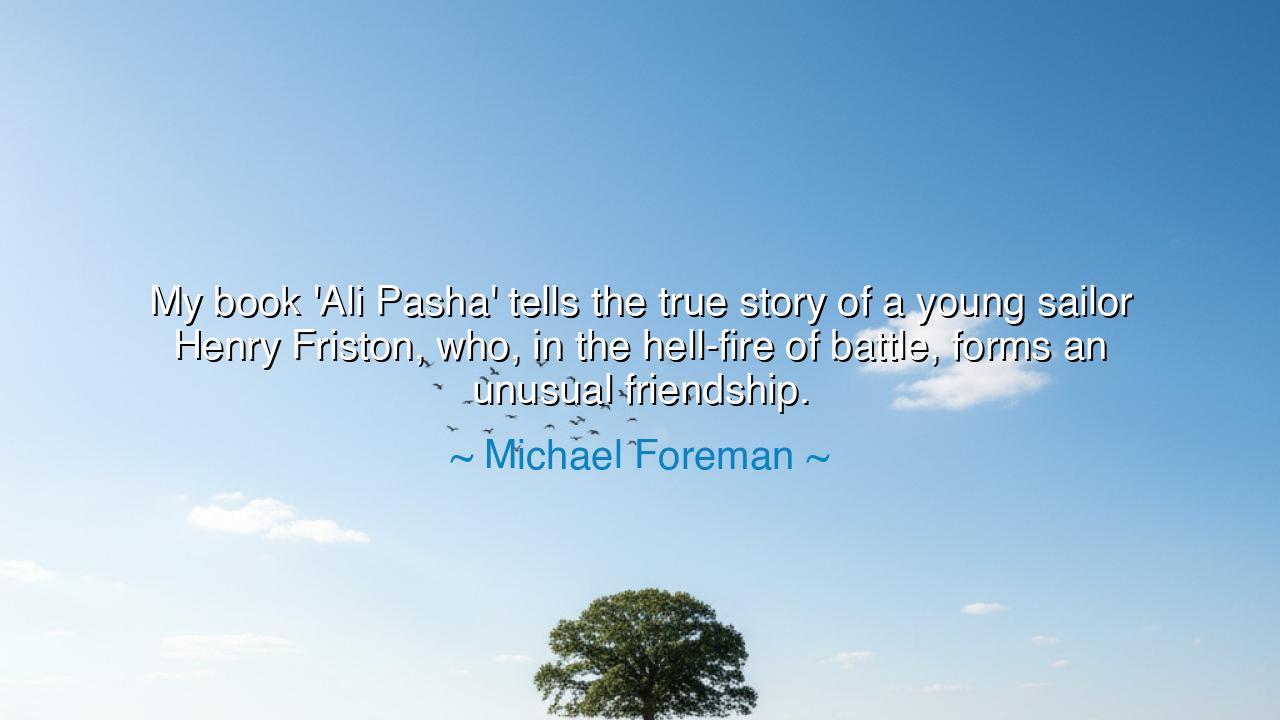
My book 'Ali Pasha' tells the true story of a young sailor Henry
My book 'Ali Pasha' tells the true story of a young sailor Henry Friston, who, in the hell-fire of battle, forms an unusual friendship.






In his reflection, Michael Foreman speaks of the power of compassion amid the devastation of war: “My book Ali Pasha tells the true story of a young sailor Henry Friston, who, in the hell-fire of battle, forms an unusual friendship.” These words illuminate one of the oldest and noblest truths known to humankind — that even in the darkest depths of violence, the light of friendship and mercy can still be born. The story he references is not merely a tale of survival; it is a testament to the enduring capacity of the human heart to choose kindness where hatred reigns.
The origin of this quote lies in Foreman’s book Ali Pasha, based on a true episode from the First World War. The young sailor Henry Friston, serving aboard a Royal Navy ship at Gallipoli, found an injured tortoise amid the burning wreckage of battle. Against all sense of logic or military duty, he chose to save it. He named the tortoise Ali Pasha, and the two became inseparable companions through the chaos of war and the long years that followed. Their story, simple yet profound, stands as a symbol of humanity preserved in inhuman times — a whisper of gentleness amid the roar of destruction.
Foreman’s words remind us that friendship is not bound by species, circumstance, or expectation. It arises in the most unlikely of places — even in the “hell-fire of battle.” The sailor’s act of mercy toward a fragile creature reveals that love is not a luxury of peace, but a necessity of the soul. It is precisely when the world is most brutal that tenderness becomes an act of heroism. Henry Friston’s friendship with Ali Pasha was not only a personal solace but a silent rebellion against the madness of war — a declaration that even amid death, one can still choose life.
This truth echoes through the ages. In the trenches of the Great War, amidst mud and terror, soldiers on both sides sometimes ceased fire on Christmas Day to share gifts and songs — an event history remembers as the Christmas Truce of 1914. For a few brief hours, enemies became men again, exchanging tobacco and laughter instead of bullets. Like Friston and his tortoise, they rediscovered their humanity in the midst of horror. It is such moments that remind us that the essence of civilization is not victory, but empathy — the courage to care when the world tells us to hate.
Foreman’s quote, though rooted in a story of a sailor and his tortoise, speaks to a universal law: that friendship is the purest expression of the human spirit. It transcends language, culture, and even species, because it flows from the same divine source — the will to connect, to protect, to affirm life. When he says “an unusual friendship,” he is not only describing a man and an animal, but the mystery of kindness born of chaos, of peace found within storm.
There is also a deeper reflection here — that the small acts of love we perform in times of suffering often outlast the great deeds of war. Armies rise and fall, but the simple gesture of saving a life, however humble, endures as a monument to the heart’s true power. Henry Friston’s compassion did not alter the course of the war, but it preserved something even more sacred: his soul’s integrity. Foreman, as a storyteller, reminds us that these are the stories that keep humanity alive — the quiet ones, whispered between explosions, carried forward by those who still believe in gentleness.
The lesson, therefore, is timeless: even in your fiercest battles, never let your heart grow cold. Seek friendship wherever it may appear — in a comrade, in a stranger, even in a small creature crossing your path. In practical action, this means practicing mercy amid conflict, and choosing understanding over judgment. For every act of kindness, however small, defies the chaos of the world and brings us closer to peace. As Foreman’s tale shows, it is not always the victors who shape history — sometimes, it is the ones who stop to save a tortoise amid the fire, and in doing so, remind the world what it means to be truly human.






AAdministratorAdministrator
Welcome, honored guests. Please leave a comment, we will respond soon